huide
thread rolling machine uk
We have turned up as a leading supplier in these lines.Fengsheng skilled engineers are adept at finding optimum solutions to your investment.
| Product name | thread rolling machine uk |
| Keyword | hs code for hydraulic thread rolling machine,cold rolling machine to thread parts,full rod thread rolling machine,thread cutting machine for rolling,good price and quality thread rolling machine |
| Place of Origin | China |
| Production Capacity | 213~400/Per Min |
| Power | 2.2~6kw |
| Thread Dia(mm) | 2.0~4.0 |
| Core Components | Motor |
| Thread Length(mm) | 6~50 |
| Condition | New |
| Pre-Sales Service | Inquiry and consulting support. View our Factory. |
| Feature | pipe nipple threading machine in its rolling pressure range of cold, the workpiece for thread, ruled, twill and other treatment; straight, helical and oblique spline gear rolling; straightening, reducing diameter, rolling and various forming rolling. |
| Dimensions | 1969mm*1664mm*1637mm, (Contact us for specific information to confirm) |
| Applicable Industries | motorcycle manufacturing industry, etc. |
| Advantages | thread rolling machine uk--It can be used to process scerw and rebar.The rebar processed by the machine has the good overall mechanical.It can make the tensile strength increased by 20%-30%,the fatigue strength increased by 40%-60%,corrosion resistance increased by 50%-200%.Mechanical properties of rebar connector reached and more than international standards. |
| Weight | 2918kg |
| Product Description | The machine has a safe and reliable electro-hydraulic execution and control system. Each work cycle can be selected in manual, semi-automatic and automatic ways. |
| terms of packing | enerally, we pack our goods in plywood cases. |
| terms of paymen | T/T 30% as deposit, and 70% balance against BL copy |
| Life span | 20 years (Contact us for specific information to confirm) |
| After-sale service | 12 months warrantly, man-made destory will be exception. |
| thread rolling machine uk Advantage | We keep good quality and competitive price to ensure our customers benefit |
| Packing | 2651x2104x2234mm(Contact us for specific information to confirm) |
| OEM/ODM | Customization Service Provided |
| Sales country | All over the world for example:Iraq,Puerto Rico,Kenya,Dominican Republic,Turkmenistan,Paraguay,Mauritius |
| MOQ | 2pcs(Contact us for specific information to confirm) |
| Delivery time | 15-20 days for OEM, 5-7days for ready goods. |





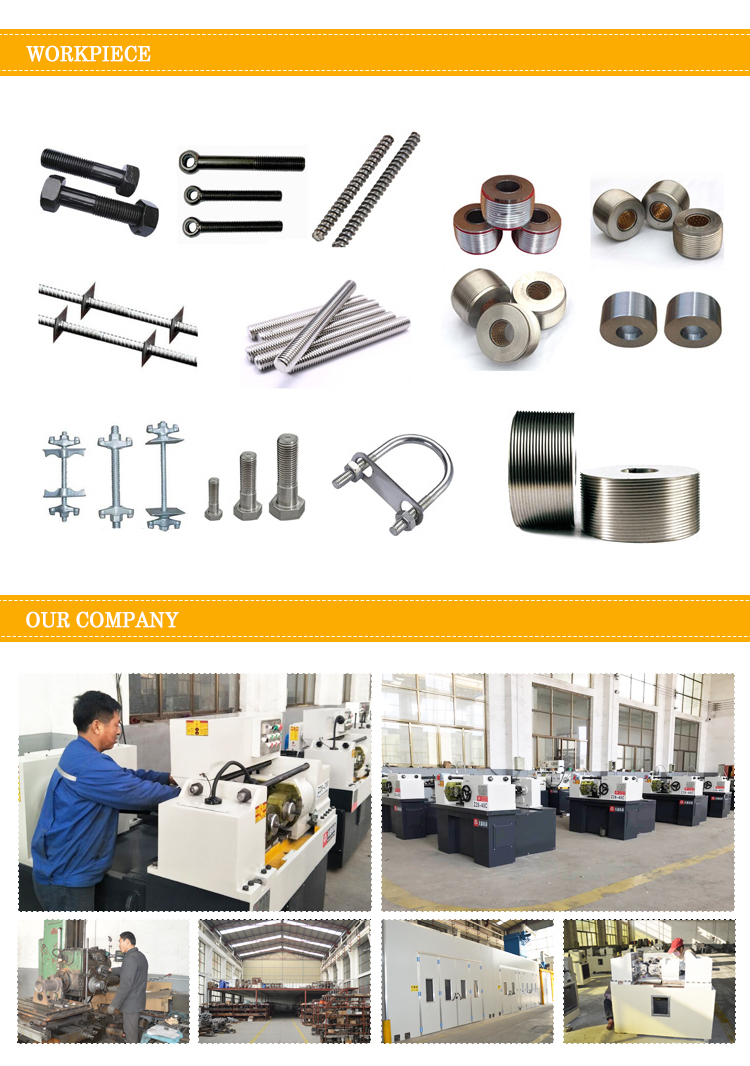

thread rolling machine uk
huide-machinery.as one of the most professional thread rolling machine uk manufacturer has the advantages at:
We are the leader thread rolling machine supplier in China, also we have customers worldwide, such as America, Argentina, Brazil, Belarus, Bangladesh, Iraq,Puerto Rico,Kenya,Dominican Republic,Turkmenistan,Paraguay,Mauritius, and Italy.We are factory specializing in the manufacture and export of thread rolling machine for more than 20 years, all of the production we sale are at a very best price and high quality.
We take care of our product quality, any defect of the goods, we will take responsibility. You are risk-free.And we believe that the good quality products will can give us survival, so, we always offer the top quality products to our customers, to keep them have the competitiveness in there market.
thread rolling machine uk services FAQs Guide
Are you looking for a quick review guide about thread rolling machine ukservices?
An ultimate FAQ buying guide is available to help you.This guide contains all the information about all the important facts, figures, and various processes regarding thread rolling machine uk services.
Let’s continue!
2.What is the Difference Between Annular and Circular Thread Rolling?
3.Can a thread rolling machine uk Create Threads with Different Tolerances?
4.How does a thread rolling machine uk contribute to the accuracy and precision of threaded parts?
5.Is the thread rolling process more cost-effective than traditional machining methods?
6.How long does it take to set up and operate a thread rolling machine uk?
7.What Types of Materials can be Used with a thread rolling machine uk?
8.What is the Typical Production Rate of a thread rolling machine uk?
9.What are the most common applications for a thread rolling machine uk?
10.What are Some Common Defects in Threads Created by a thread rolling machine uk?
11.Can a thread rolling machine uk Create Threads in Different Shapes?
12.How Does the Thread Rolling Process Work?
13.How Accurate are Threads Created by a thread rolling machine uk?
14.Can thread rolling be used on already machined parts?
15.Can a thread rolling machine uk create threads on hardened materials?
1.Can a thread rolling machine uk handle both internal and external threads?
We focus on our customers' needs and strive to meet their expectations, so we take this very seriously.
Yes, some thread rolling machines are designed to handle both internal and external threads. These machines have different sets of dies and adjustments to accommodate the different types of threads. However, some machines may only be able to handle either internal or external threads, so it is important to check the specifications of the specific machine.
2.What is the Difference Between Annular and Circular Thread Rolling?
We have been working hard to improve service quality and meet customer needs.
Annular and circular thread rolling are two methods used to create threads on cylindrical parts. The main difference between these two methods lies in the shape of the thread produced.
Annular thread rolling is a process in which a cylindrical part is rotated between two dies, one of which has a thread-shaped groove. As the part is rotated, the dies move together, pressing the thread-shaped groove into the surface of the part, creating a helical thread. This method produces threads with a triangular cross-section, with rounded peaks and valleys.
On the other hand, circular thread rolling is a process in which a cylindrical part is rotated between two dies, both of which have thread-shaped grooves. As the part is rotated, the dies move together, pressing the thread-shaped grooves into the surface of the part, creating a helical thread. This method produces threads with a circular cross-section, with sharp peaks and valleys.
In summary, the main difference between annular and circular thread rolling is the shape of the thread produced. Annular thread rolling produces triangular threads, while circular thread rolling produces circular threads. The choice between these two methods depends on the specific requirements of the application and the desired thread shape.
3.Can a thread rolling machine uk Create Threads with Different Tolerances?
Yes, a thread rolling machine can create threads with different tolerances. The machine can be adjusted to produce threads with different pitch, diameter, and depth, which ultimately affects the tolerance of the thread. The operator can also adjust the pressure and speed of the machine to achieve the desired tolerance. However, it is important to note that the accuracy and consistency of the thread rolling machine play a crucial role in achieving the desired tolerance. Regular maintenance and calibration of the machine are necessary to ensure consistent and accurate thread production.
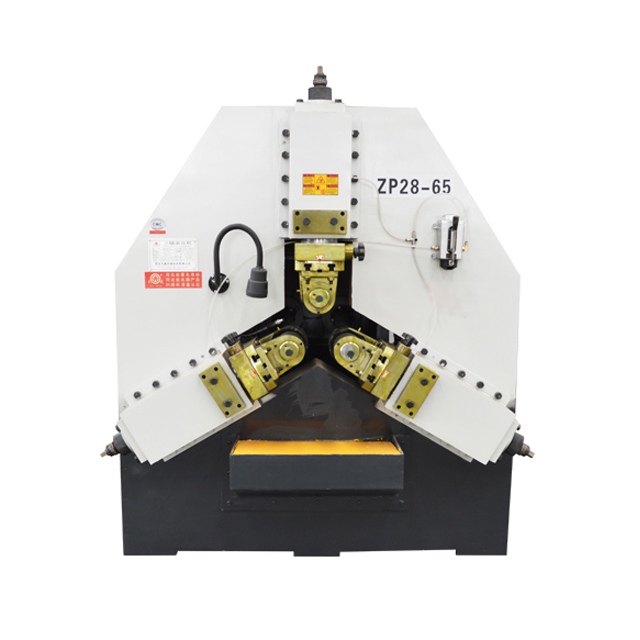
4.How does a thread rolling machine uk contribute to the accuracy and precision of threaded parts?
We are committed to providing personalized solutions and established long -term strategic cooperative relationships with customers.
A thread rolling machine contributes to the accuracy and precision of threaded parts in several ways:
1. Consistent Thread Profile: Thread rolling machines use a set of dies to form the threads on a workpiece. These dies are precisely machined to create a specific thread profile, ensuring that each thread is identical in shape and size. This results in a more accurate and precise thread compared to other methods such as cutting or grinding.
2. Uniform Thread Pitch: The dies on a thread rolling machine are designed to maintain a constant thread pitch throughout the entire length of the thread. This ensures that the threads are evenly spaced and have a consistent depth, leading to better accuracy and precision.
3. Reduced Material Deformation: Thread rolling machines use a cold forming process, where the material is not subjected to high temperatures. This reduces the risk of material deformation, which can affect the accuracy and precision of the threads.
4. Tight Tolerances: Thread rolling machines are capable of producing threads with tight tolerances, often within a few thousandths of an inch. This level of precision is difficult to achieve with other methods, making thread rolling a preferred choice for high-precision applications.
5. Repeatable Results: The use of dies and a controlled process in thread rolling ensures that the same results are achieved every time. This makes it easier to produce large quantities of threaded parts with consistent accuracy and precision.
Overall, a thread rolling machine offers a more controlled and precise method of creating threads, resulting in higher accuracy and precision of threaded parts. This makes it a preferred choice for industries such as automotive, aerospace, and medical, where precision is critical.
5.Is the thread rolling process more cost-effective than traditional machining methods?
We are a new thread rolling machine uk manufacturer.
Yes, the thread rolling process is generally more cost-effective than traditional machining methods for producing threads. This is because thread rolling is a faster and more efficient process that requires less material and labor compared to traditional machining methods such as cutting or grinding. Additionally, thread rolling produces stronger and more precise threads, reducing the need for additional finishing processes.
6.How long does it take to set up and operate a thread rolling machine uk?
We should enjoy a good reputation in the industry, and we can increase the added value of the products of cooperative customers through technological innovation.
The time it takes to set up and operate a thread rolling machine can vary depending on the specific machine and the experience of the operator. Generally, it can take anywhere from 15 minutes to an hour to set up the machine, including adjusting the dies and making any necessary adjustments. Once the machine is set up, the actual operation can take anywhere from a few seconds to a few minutes, depending on the length and complexity of the thread being rolled. With practice and experience, an operator can become more efficient and reduce the setup and operation time.
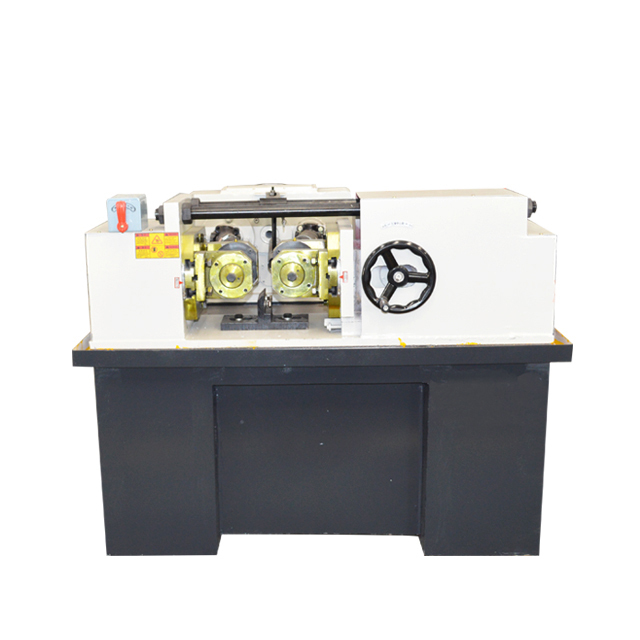
7.What Types of Materials can be Used with a thread rolling machine uk?
We continue to invest in research and development and continue to launch innovative products.
1. Metal: Thread rolling machines are primarily used for rolling threads on metal materials such as steel, aluminum, brass, and copper. These materials are commonly used in industries such as automotive, aerospace, and construction.
2. Plastic: Some thread rolling machines are also capable of rolling threads on plastic materials such as nylon, PVC, and acrylic. These materials are commonly used in industries such as electronics, medical, and consumer goods.
3. Wood: Thread rolling machines can also be used to create threads on wooden materials such as hardwood and softwood. These threads are commonly used in furniture making and woodworking industries.
4. Composite materials: Thread rolling machines can also be used to roll threads on composite materials such as carbon fiber, fiberglass, and Kevlar. These materials are commonly used in industries such as aerospace, marine, and sports equipment.
5. Rubber: Some thread rolling machines are also capable of rolling threads on rubber materials such as silicone, neoprene, and EPDM. These materials are commonly used in industries such as automotive, construction, and medical.
6. Ceramic: Thread rolling machines can also be used to create threads on ceramic materials such as porcelain, clay, and glass. These materials are commonly used in industries such as pottery, construction, and electronics.
7. Other materials: Depending on the type and capabilities of the thread rolling machine, it may also be able to roll threads on other materials such as leather, paper, and fabric. These materials are commonly used in industries such as fashion, packaging, and upholstery.
8.What is the Typical Production Rate of a thread rolling machine uk?
The typical production rate of a thread rolling machine can vary depending on the type and size of the machine, as well as the material being rolled. However, on average, a thread rolling machine can produce between 60 to 120 parts per minute. Some high-speed machines can even produce up to 300 parts per minute.
9.What are the most common applications for a thread rolling machine uk?
We operate our thread rolling machine uk business with integrity and honesty.
1. Fastener Manufacturing: Thread rolling machines are commonly used in the production of screws, bolts, and other fasteners. They can produce threads on a variety of materials such as steel, aluminum, and brass.
2. Automotive Industry: Thread rolling machines are used in the production of automotive parts such as engine components, transmission parts, and suspension components. They are also used for repairing damaged threads on automotive parts.
3. Aerospace Industry: Thread rolling machines are used in the production of aerospace components such as aircraft engine parts, landing gear, and structural components. They are also used for repairing damaged threads on aircraft parts.
4. Construction Industry: Thread rolling machines are used in the production of construction materials such as bolts, nuts, and screws. They are also used for repairing damaged threads on construction equipment.
5. Furniture Industry: Thread rolling machines are used in the production of furniture components such as screws, bolts, and dowels. They are also used for repairing damaged threads on furniture pieces.
6. Medical Industry: Thread rolling machines are used in the production of medical devices such as surgical instruments, implants, and orthopedic screws. They are also used for repairing damaged threads on medical equipment.
7. Electrical Industry: Thread rolling machines are used in the production of electrical components such as connectors, terminals, and switches. They are also used for repairing damaged threads on electrical equipment.
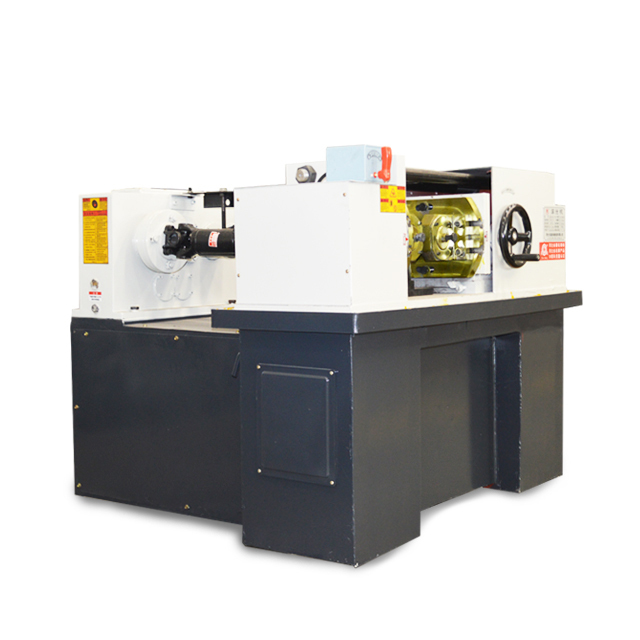
10.What are Some Common Defects in Threads Created by a thread rolling machine uk?
1. Incomplete Threads: This is a common defect where the thread is not fully formed or is missing in certain areas. This can be caused by improper alignment of the thread rolling machine or worn out dies.
2. Oversized Threads: This defect occurs when the thread is larger than the specified size. It can be caused by excessive pressure or incorrect die settings.
3. Undersized Threads: This is the opposite of oversized threads, where the thread is smaller than the specified size. It can be caused by insufficient pressure or worn out dies.
4. Tapered Threads: Tapered threads have a gradual change in diameter along the length of the thread. This can be caused by misalignment of the dies or uneven pressure during the rolling process.
5. Misaligned Threads: This defect occurs when the threads are not straight and parallel to each other. It can be caused by misalignment of the dies or improper setup of the machine.
6. Thread Flaking: Thread flaking is when small pieces of the thread break off, resulting in a rough and uneven surface. This can be caused by worn out or damaged dies.
7. Thread Cracks: Cracks in the thread can occur due to excessive pressure or improper die settings. This defect can weaken the thread and lead to failure under stress.
8. Thread Galling: Galling is a form of wear that occurs when two surfaces rub against each other. It can cause the thread to seize up and become difficult to turn.
9. Thread Stripping: This defect occurs when the thread is stripped or torn off the surface of the material. It can be caused by excessive pressure or incorrect die settings.
10. Thread Runout: Thread runout is when the thread is not concentric with the axis of the material. This can be caused by misalignment of the dies or uneven pressure during the rolling process.
11.Can a thread rolling machine uk Create Threads in Different Shapes?
We have a first -class management team, and we pay attention to teamwork to achieve common goals.
Yes, a thread rolling machine can create threads in different shapes. Thread rolling machines use a set of dies to form the threads on a workpiece. These dies can be customized to create threads in various shapes, such as square, rectangular, triangular, or even custom shapes. The shape of the thread is determined by the shape of the dies used in the machine. Therefore, by changing the dies, a thread rolling machine can create threads in different shapes. This makes thread rolling machines versatile and suitable for a wide range of applications.
12.How Does the Thread Rolling Process Work?
We attach importance to the innovation ability and team spirit of employees, have advanced R & D facilities and laboratories, and have a good quality management system.
The thread rolling process is a cold forming process used to create external threads on a workpiece. It involves pressing a hardened steel die onto the surface of the workpiece, causing the material to flow and form the desired thread shape.
The process begins with a blank workpiece, typically a cylindrical rod or bar, which is fed into the thread rolling machine. The machine consists of two dies, an upper and a lower die, which are mounted on parallel spindles and rotate in opposite directions.
The upper die is stationary, while the lower die is adjustable and can be moved up and down to accommodate different thread sizes. The dies are also equipped with thread profiles that correspond to the desired thread shape.
As the workpiece is fed between the two dies, it is gripped and held in place by a set of rollers. The rollers apply pressure to the workpiece, forcing it to deform and flow into the thread profile of the dies.
The dies then rotate, causing the material to be displaced and formed into the desired thread shape. The pressure and rotation of the dies continue until the thread is fully formed.
Once the thread is formed, the dies retract, and the workpiece is released. The thread is then checked for accuracy using gauges and other measuring tools.
The thread rolling process is highly efficient and can produce threads at a much faster rate than traditional cutting methods. It also results in a stronger and more precise thread, making it a preferred method for creating high-quality threads in mass production.

13.How Accurate are Threads Created by a thread rolling machine uk?
We are centered on customers and always pay attention to customers' needs for thread rolling machine uk products.
Threads created by a thread rolling machine are highly accurate and precise. This is because thread rolling is a cold forming process that uses pressure to deform the material into the desired thread shape. This results in a thread with a smooth surface and consistent dimensions.
The accuracy of threads created by a thread rolling machine depends on several factors such as the quality of the machine, the material being rolled, and the skill of the operator. However, in general, thread rolling machines can produce threads with tolerances as tight as 0.0005 inches.
Compared to other methods of creating threads, such as cutting or grinding, thread rolling offers superior accuracy and consistency. This is because the material is not removed during the process, resulting in a stronger and more precise thread.
In addition, thread rolling machines are designed to produce threads with high repeatability, meaning that each thread produced will be nearly identical to the previous one. This makes them ideal for high-volume production of threaded parts.
Overall, the accuracy of threads created by a thread rolling machine is very high, making it a preferred method for creating threads in various industries such as automotive, aerospace, and construction.
14.Can thread rolling be used on already machined parts?
We maintain a stable growth through reasonable capital operations, focus on industry development trends and cutting -edge technologies, and focus on product quality and safety performance.
Yes, thread rolling can be used on already machined parts. However, the part must have a smooth and clean surface in order for the thread rolling process to be successful. Any imperfections or roughness on the surface can affect the quality of the thread formed by the rolling process. Additionally, the part must have the correct dimensions and tolerances to ensure proper thread formation during the rolling process.
15.Can a thread rolling machine uk create threads on hardened materials?
Our company has many years of thread rolling machine uk experience and expertise.
Yes, a thread rolling machine can create threads on hardened materials.
The process of thread rolling involves pressing a hardened steel die onto the surface of the material, which displaces the material and forms the threads. This process is suitable for creating threads on a wide range of materials, including hardened materials such as stainless steel, titanium, and hardened steel. However, the hardness of the material may affect the speed and efficiency of the thread rolling process. It is important to use the appropriate die and machine settings for the specific material being threaded to ensure the best results.
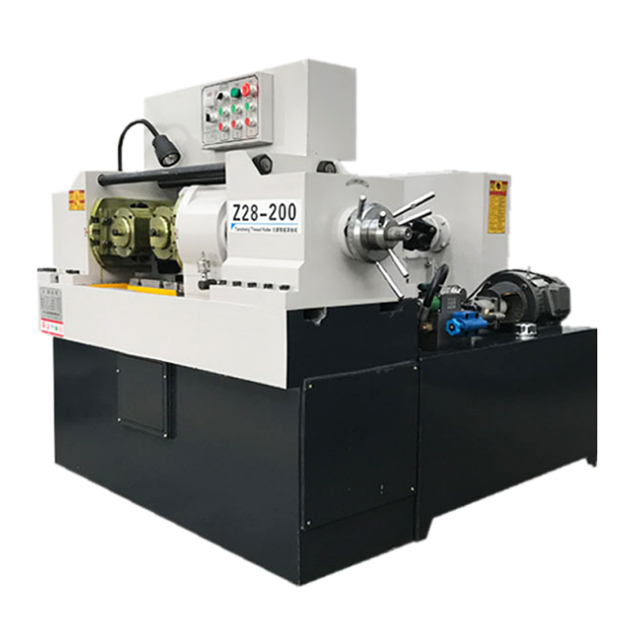
- Place of Origin:
- Video outgoing-inspection:
- Machinery Test Report:
- Marketing Type:
- Warranty of core components:
- Core Components:
- Key Selling Points:
- Applicable Industries:
- Application:
- Condition:
- Production Capacity:
- Voltage:





















